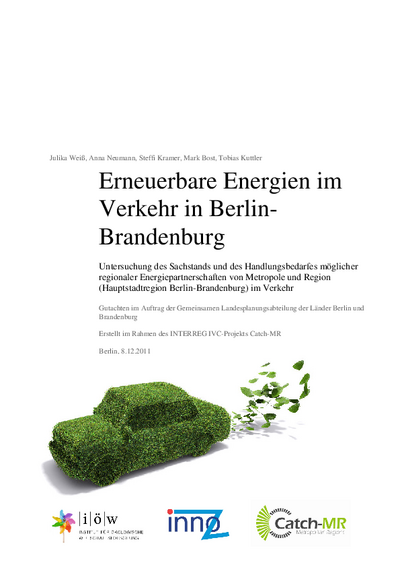Renewable energy in transport in Berlin-Brandenburg An analysis of the current status and need for action with respect to possible metropolitan-regional energy partnerships (Berlin-Brandenburg region) in the transport sector Report commissioned by the Joint Spatial Planning Department of Berlin and Brandenburg. Prepared as part of INTERREG IVC-Project Catch-MR.
The German federal states of Berlin and Brandenburg have established ambitious climate and energy policy goals. To achieve these, concepts for a more climate-friendly approach to mobility will also need to be developed and implemented. The deployment of renewable energy sources in place of fossil fuels represents – along with strategies for traffic mitigation and a shift to non-motorised and public transport – an important component of such mobility concepts. In Brandenburg there exists a strong potential for the production of renewable energy at levels that in the mid- to long-term will exceed regional demand. At the same time there is – particular in Berlin – a substantial density of demand. The premises are thus good for the deployment of regionally produced renewable energy in the transport sector of the two regions. This is the background for the analysis in this report, which examines the options available in the Berlin-Brandenburg capital region for the deployment of regionally produced renewable energy in the transport sector.
The scope of the report is limited to personal transport (public and private). This report is intended to demonstrate to stakeholders in government, business and academia the potential for mobility options based on regionally produced energy and to stimulate the development of regional energy partnerships. The results should serve to answer three questions:
What is the potential for energy production from renewable energy sources in Berlin and Brandenburg?
What is the current status and what is the potential for deployment of renewable energy in the passenger transport sector?
How can (regional) partnerships advance the deployment of renewable energy in passenger transport?



